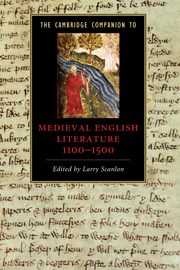Book contents
- Frontmatter
- Introduction
- Part I Contexts, genres, and traditions
- 1 Re-inventing the vernacular: Middle English language and its literature
- 2 Textual production and textual communities
- 3 Religious writing: hagiography, pastoralia, devotional and contemplative works
- 4 Romance
- 5 Dialogue, debate, and dream vision
- 6 Drama
- 7 Lyric
- 8 Lollard writings
- Part II Authors
- Guide to further reading
- Index
8 - Lollard writings
from Part I - Contexts, genres, and traditions
Published online by Cambridge University Press: 28 November 2009
- Frontmatter
- Introduction
- Part I Contexts, genres, and traditions
- 1 Re-inventing the vernacular: Middle English language and its literature
- 2 Textual production and textual communities
- 3 Religious writing: hagiography, pastoralia, devotional and contemplative works
- 4 Romance
- 5 Dialogue, debate, and dream vision
- 6 Drama
- 7 Lyric
- 8 Lollard writings
- Part II Authors
- Guide to further reading
- Index
Summary
The heterodox movement known as Lollardy produced a great many writings in Latin and English. To group these writings together as a “literature” or literary tradition is a retrospective formation, although as we will see, a valid one. But those who wrote the texts would not have seen their writings as contributing to a “literary” culture in any formal sense, even though at times they appropriated certain standard literary forms or traditions to their own purposes. These writings do not fall easily into aesthetic categories of the “literary,” in the sense of observing literary modes (drama, poetry, forms of fictive narrative) or genres (romance, epic, history, lyric), although there are many examples among them of rhetorical genres such as sermons, polemic, and personal testimonies. Lollard writings productively test the limits of what might commonly be understood as the “literary,” because they constitute a textual culture embedded in political, religious, and even intellectual argument. To the extent that Lollard writings reflect upon their own literary forms or formation, it is in the interests of vernacular literacy itself: Lollard writings in English often present an acute self-consciousness about transferring a technology of critical literacy to a vernacular audience imagined as participating in a continuing process of textual interpretation and correction.
Lollard writing presents a particular set of themes that, when taken together, express dissent from orthodox religious teachings and practices. Dissent in itself is not a literary genre or form or theme: it is a posture in relation to a certain historical occasion or condition. We find many different historical developments that produced oppositional writing: among these are the rebel letters of the 1381 Peasants’ Uprising; bills, libels, and similar public documents associated with moments of acute unrest, such as Cade’s Rebellion of 1450; and more persistently, a long tradition of social satire and complaint against corruption of the clergy, which might have been acidic in its attack but was not necessarily suppressed.
- Type
- Chapter
- Information
- The Cambridge Companion to Medieval English Literature 1100–1500 , pp. 111 - 122Publisher: Cambridge University PressPrint publication year: 2009
- 1
- Cited by



